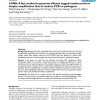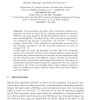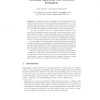102 search results - page 10 / 21 » An Improved Zero-One Law for Algorithmically Random Sequence... |
BMCBI
2008
14 years 11 months ago
2008
Background: Pathogen detection using DNA microarrays has the potential to become a fast and comprehensive diagnostics tool. However, since pathogen detection chips currently utili...
BMCBI
2010
14 years 11 months ago
2010
Background: Finishing is the process of improving the quality and utility of draft genome sequences generated by shotgun sequencing and computational assembly. Finishing can invol...
107
Voted
NAA
2000
Springer
15 years 3 months ago
2000
Springer
Abstract. The convergence of Monte Carlo method for numerical integration can often be improved by replacing pseudorandom numbers (PRNs) with more uniformly distributed numbers kno...
106
click to vote
APPROX
2011
Springer
13 years 11 months ago
2011
Springer
Abstract. We study the space complexity of randomized streaming algorithms that provide one-sided approximation guarantees; e.g., the algorithm always returns an overestimate of th...
ECCV
2000
Springer
16 years 1 months ago
2000
Springer
The problem of tracking pedestrians from a moving car is a challenging one. The Condensation tracking algorithm is appealing for its generality and potential for real-time implemen...



